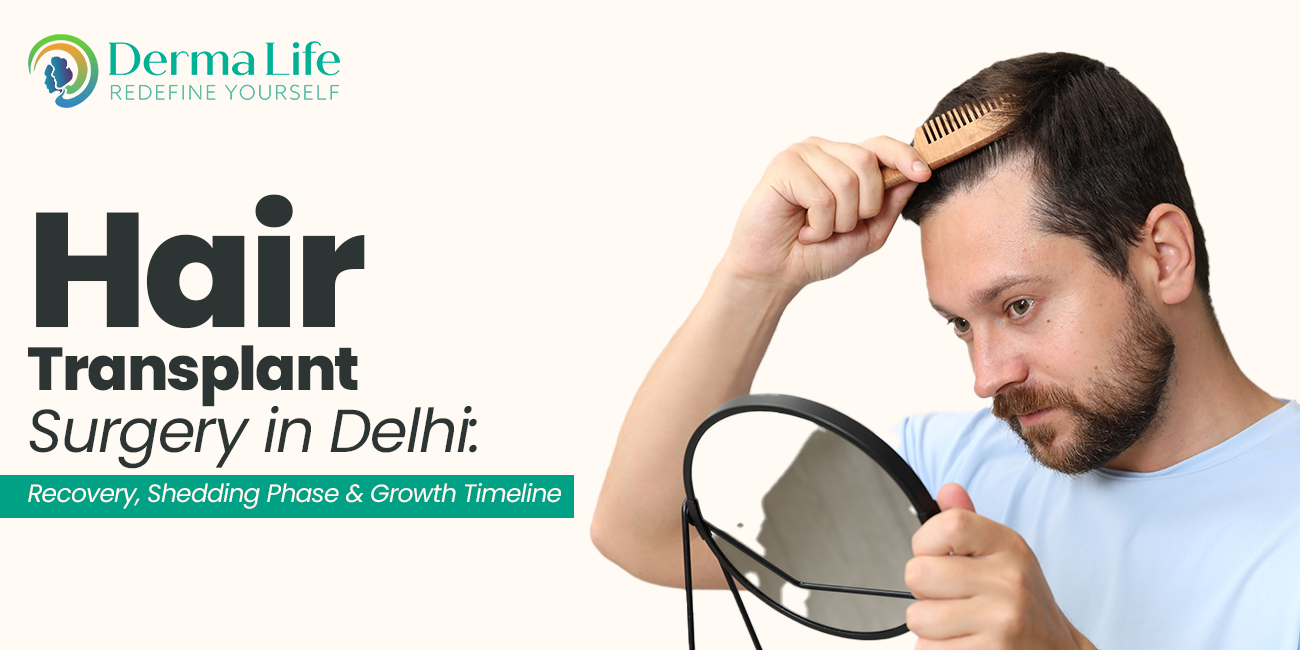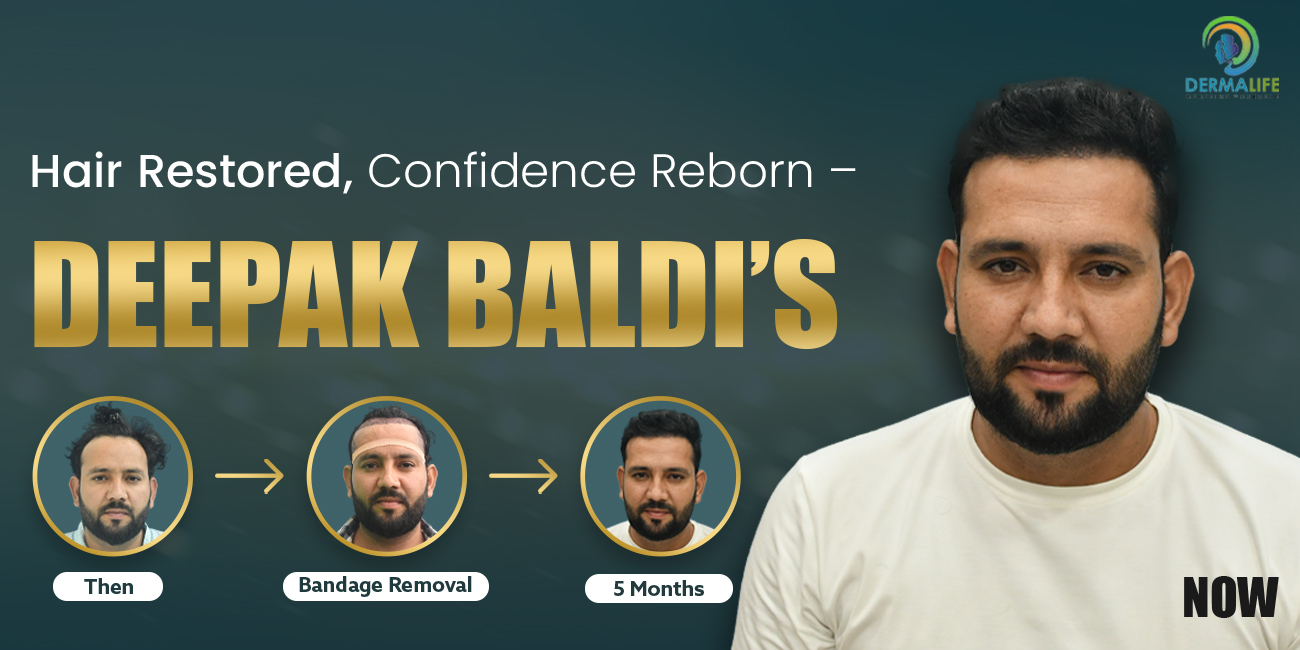Undergoing a hair transplant is a pretty transformative life decision you’d need to consider. Is it the right move for you? Do you have reliable hair transplant specialists in the area where you live? Are you ready to proceed with realistic expectations? Will the budget be a concern?
These are some common questions most people have BEFORE undergoing a hair transplant. But what about the post-operative expectations? The most common thing that most people expect is optimal and favorable results, which they discuss with their surgeon before the procedure.
In this comprehensive guide, we will look at the top tips for the best hair transplant results that every patient should implement.
How Long is Recovery After a Hair Transplant?
Before we discuss the tips to optimize your hair transplant results, it makes sense for you to understand what the recovery process would look like.
At Dermalife, our leading hair transplant specialist, Dr. Gaurav Garg, prioritizes giving the patients a comprehensive understanding of how the post-operative recovery would look. Besides being transparent, ensuring that the patient has realistic expectations from the surgery is vital as well.
Here’s a breakdown of how recovery would look like after a hair transplant:
Immediate post-op recovery (Days 1-2) – It is common to experience some level of swelling, redness, and discomfort around the transplanted area and donor site. During this period, you will also be instructed regarding ways to clean the scalp, take the prescribed medications, and adhere to the post-surgery recommendations.
First week – The swelling and redness typically subsides by the first week, but patients must avoid strenuous activities. Also, experiencing scabbing around the transplant site is normal, but it is essential to avoid picking at them.
Two weeks – By the second week, the swelling and redness should have completely healed. However, it is necessary to stick to the post-operative care instructions and avoid direct sunlight exposure or other external trauma to the scalp.
First month – The transplanted hair follicles rest during this period, and you may notice some shedding. This is a normal process, and new hair growth will follow. Avoid any kinds of activities that can result in sweating around the scalp.
Two to three months – Many patients start to see early signs of hair growth during this period. However, the growth is often subtle, and most results are still months away. You will get a list of hair care product recommendations from our specialists at Dermalife to support the hair regrowth process.
Four-six months – A more noticeable hair density and thickness improvement may occur during this phase. Being patient is quintessential during the recovery phase.
Six to twelve months – By the end of the first year, most patients will have experienced significant hair growth, and the final results of the transplant become more apparent. Also, the transplanted hair should seamlessly blend in with the existing hair, providing a natural and aesthetically pleasing appearance.
Every person’s recovery is different, so we recommend scheduling regular follow-up appointments at Dermalife to monitor the healing and growth of the hair at the transplant site.
Tips For the Best Hair Transplant Results
Hair transplant has advanced significantly over the years; however, achieving the best possible results still requires careful consideration and aftercare. If you want to witness the best hair transplant results, it makes sense to follow all the tips that will help you achieve optimal results and a successful recovery.
1. Choosing a qualified and experienced surgeon
Now, you must think, “Aren’t we discussing how to attain the best hair transplant results?” Technically, if your transplant isn’t done right, the results will be botched.
This explains why you need to focus on finding the best hair transplant specialist. When researching for the best transplant surgeon, you want to focus on factors like board certification, years of experience, and a proven track record of high success rates with patients.
Dr. Gaurav Garg is a leading name in the field of hair transplant surgery and has worked with thousands of patients, the majority of whom include celebrities and known public figures. At Dermalife, you can trust the surgeon and the staff to ensure your hair transplant succeeds.
2. Proper Scalp Care
Post-transplant scalp care is hands down one of the main factors influencing the results you are looking for. After the surgery, good hygiene for your scalp involves keeping it clean, preventing dirt and dust from settling on the scalp, and preventing sweat build-up.
Also, you will receive a thorough post-transplant scalp care regime from your surgeon, which you need to follow. This includes doing everything to keep the scalp clean and healthy to prevent risks of infection, which is often one of the most common complications.
When you finally have the green light to use products and wash the scalp, prioritize using mild and non-medicated shampoo, as instructed by the surgeon. Also, the key is to be gentle while scrubbing your scalp. You don’t want to be too harsh and abrasive.
3. Taking Prescribed Medication and Supplements
To promote optimal hair regrowth after the transplant, the surgeon will prescribe a list of supplements and medications, including Finasteride and minoxidil, which stimulate the hair follicles, thereby prompting further hair growth.
Some popular supplements that help achieve optimal transplant results include biotin, Vitamin D and E, and minerals like Zinc and iron. If you want to achieve the ideal hair transplant before and after results, sticking to taking these medications and supplements is an absolute must.
4. Focusing on healthy diet and nutrition
Sometimes, when it comes to achieving optimal hair transplant results, it isn’t just about the external hair care that you focus on and prioritize. Instead, it is also influenced by what you put inside your body, aka, the food you eat.
You want to eat foods that are naturally high in vitamins and minerals. Not just that, eating a high-protein diet is also key in attaining desired results and promoting hair growth after the transplant.
So, besides eating fresh produce, whole grains, etc., include high-protein items like eggs, lean meats, legumes, and fish, in your diet. Also, include fresh fruits and vegetables rich in Vitamins A, C, and E.
5. Protect the scalp from the sun
Exposing your scalp to direct sunlight after a hair transplant can harm healing. The sensitive recipient area is susceptible to sunburn and increased inflammation, which may adversely affect the transplanted hair follicles.
So, if possible, stay indoors for the first one or two weeks after the transplant procedure. If that’s not feasible for you because you must go to work or run errands, you must have a protective shield on the scalp to prevent direct exposure to the sunlight.
You can protect the scalp by wearing a hat or sunscreen with adequate SPF outdoors, especially during the initial weeks following the procedure.
6. Focus on hydration
Not many people pay attention to this factor, but hydration is integral to your hair and scalp health after the transplant procedure.
If your hair is not properly hydrated, it increases the risks of breakage due to dryness and dullness. So, ideally, you want to drink 6-8 glasses of water throughout the day to maintain your scalp and hair health. Additionally, when the body is hydrated, it internally stimulates and triggers hair regrowth down the road.
Also, if you are not hydrated enough, it can dry the skin, which can pull on the scalp’s skin and damage the transplanted follicles, too.
7. Be patient and realistic
Hair transplant results take time to manifest, and patience is key during the post-operative period. Hair growth is gradual, and noticeable results may not be immediate.
This is exactly what Dr. Gaurav Garg prioritizes with his patients as well. Being realistic about the timeline of hair growth after the transplant is key. Since everyone’s recovery is different, it makes sense that things might be a little slower (or quicker) for you than what’s considered standard.
While some individuals experience early growth, others may see a shedding phase before new hair emerges. Patience and realistic expectations are vital for a positive overall experience.
8. Schedule follow-up appointments
Regular follow-up appointments are quintessential to monitor the results and address any concerns or questions you may have. These appointments analyze the healing and recovery, provide additional guidance on aftercare, and make any necessary adjustments to optimize the outcome.
If you find things getting complicated or any concerns you are experiencing during the recovery process, it is vital to have an open conversation with your surgeon to analyze what’s wrong and what can be done to avert any risks down the road.
9. Prioritize stress management
Stress levels have a direct correlation with hair growth. So, to achieve celebrity hair transplants before and after like results, you must prioritize stress management.
There are several ways to navigate through the stress that you might be experiencing. Meditation or breathing exercises, you can follow up with the technique that works ideally for your well-being at that moment.
If you are usually stressed out, you must integrate relevant stress management techniques into your daily routine to alleviate the stress well.
Conclusion
A successful hair transplant requires careful consideration before, during, and after the procedure. If you want to attain your desired results, it makes sense to focus on the tips we have mentioned in this guide.
Besides that, a healthy hair transplant experience solely depends on your hair transplant surgeon, and that’s where Dr. Gaurav Garg and Dermalife step into the picture. If you want a natural-looking, fuller head of hair and a boost in confidence, schedule a consultation with us today!
Are you considering a hair transplant to address severe hair loss concerns but unsure about the costs involved? Look no further than Dermalife in Delhi for hair transplant costs, where we offer comprehensive consultations and transparent pricing plans tailored to your individual needs. Our team of experienced professionals understands the significance of affordability alongside quality results. From initial assessments to post-operative care, we prioritize your satisfaction and confidence in every step of your hair restoration journey. Contact Dermalife today to explore your options and take the first step towards regaining your natural hairline and confidence.





